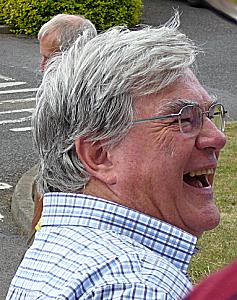|
Apiguard Diary Beekeepers - Past and Present |
Beekeeping Articles Written By Ruary Rudd |
|---|

|
In order to introduce you to GBBG member Ruary Rudd... I will reproduce an excellent profile of him that appeared in the Galtee Bee Breeding Group's newsletter the Four Seasons, the article was written by Norman Walsh and is reproduced in the white panel below. There are a number of photographs that involve Ruary on the various pages of this website that refer to the annual conferences that are held in Gormanston each year. The one shown at left has captured him in jovial mood on the occasion of the group photograph at Gormanston in 2006. |
|---|
THE SCIENTIFIC BEEKEEPER...
|
Page created 15/03/2007
Page updated 27/12/2020
Printed from Dave Cushman's website Live CD version
Norman Walsh Article... Winter 2004, This Page... 15 March 2007, Upgraded... 01 December 2007,
|
